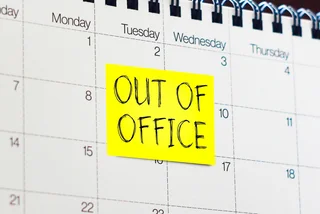Looking for a job in Prague?
Click here to find thousands of positions for English and multi-lingual speakers.
Whether you’re giving or being given notice can differ whether you are an employee or a freelancer. Below is an overview of some of the things you should know.
Employees
For the purpose of this article, employee means someone who is directly employed. You have a salary, rather than submitting invoices and your employer pays part of your health insurance. If you are here on a long-term visa, you will also have a work permit. It also means that you are covered and bound by the following provisions from the Czech Labor Code.
Quitting
There are two ways to quit according to Czech Law. First, you obtain a ‘termination by agreement’ (výpověď dohodou). This written agreement made by you and your employer states explicitly the day your employment finishes. If you are quitting it does not need to include the reason why. Remember, it must be in writing or the termination is not valid. See section 49 of the Czech Labor Code. Available here in English; it’s available here in Czech if you want to compare. The notice should be clearly understood by your employer, according to section 37, paragraph 1 of the Czech Civil Code. Therefore, if your employer speaks English, there is no reason why it can´t be submitted in English.
If the employer does not consent to a ‘termination by agreement,´ i.e. he/she doesn´t agree with the day you wish to leave, then your termination period will be two months from the first day of the month following the submission of notice. Or more simply, if you hand in your notice on the 15th April, the two months start from the 1st May, just as it would if you had submitted your notice on the 1st April or 30th April. Your notice has to be in writing or it is void. You do not have to state your reasons. If you do, then they can be for whatever reason you say. If you were to leave the job before the end of these two months, it would be a breach of your contract.
On the off chance you have a change of heart; that better job falls through or life throws you a curve ball and you need to stay in your soon-to-be former job, a withdrawal of notice can only be obtained if your employer agrees. It also has to be in writing. See section 50, paragraph 3 of the Czech Labor Code.
When you first start a new job, during the trial period, which cannot be longer than three months, you can quit almost immediately. “As a rule,” notice should be given three days before the date you wish to end your employment.
There are two instances when you can resign automatically without your employer’s consent. The first is if you submit a medical certificate to show that you cannot continue in your present position for health reasons and your employer has not found you a suitable alternative position within 15 days. Or, if your employer fails to pay your wages, salary or part thereof within 15 days from the ‘maturity’ day, i.e. day of payment, which should be stated in your contract. In the case of failure to pay, an employee is entitled to severance pay up to three times his/her average monthly salary.
Firing
Mutual agreement to end employment can be initiated by the employer. Yes, you can agree to be fired. The conditions are similar to a ‘termination by agreement’ requested by an employee. One difference is that a reason must be stated in the notice. This is also covered by section 49 of the Labor Code.
Otherwise an employer must give you two months notice starting on the first day of the month after the notice is served. In other words, it’s the same period as when an employee gives notice. As with employer-initiated ‘termination by agreement’, the notice must contain a reason and this reason cannot be confused with another. These reasons are listed in section 52 of the Labor Code. The following is a brief summary of the reasons why your employer can terminate your working relationship:
a) the employer’s business, or part of it, closes down
b) the employer’s business relocates
c) the employee is made redundant because of changes to tasks, equipment, downsizing or restructuring
d) for certified medical reasons such as industrial disease or injury, or the risk thereof
e) based on medical examination, the employee has lost his or her long-term ability to perform his job
f) breaches of duty that would not be classified as ‘serious’
This is just a glimpse at the law, which of course is much more complicated. If you have any questions, please consult with a professional.
If you lose your job for reasons a) and c) and there is no longer any company or department to be employed in, you are entitled to severance pay equal to three times your average monthly salary. Severance pay is covered in section 67 of the Labor Code.
The notice period does not include so-called protection periods, for example maternity leave or sick leave. See section 53 for the full list of reasons why an employee is protected. During this time, an employer cannot dismiss you. However, if you are dismissed from your position before the protection period, the termination period recommences after you return to work. So if you are fired, and after the first month of the two month termination period passes, you fall ill and have time off work, you can return to work for another month after your sick leave to complete the termination period unless you request otherwise. In other words, you would be submitting a ‘termination by agreement. It’s conceivable that you could submit such a request during an ordinary two-month termination period too.
In some cases, you can be sacked immediately. The grounds for instant dismissal are covered in division 4, section 55 – 56. These reasons are:
a) for being sentenced to a criminal offense for over one year, or if the offense is connected with carrying out his/her job
b) a ‘gross’ breach of conduct
A pregnant woman, a woman on maternity leave or an employee on parental leave cannot be instantly sacked. Nor can you be fired while on sick leave or while deemed unfit to carry out your duties.
As with quitting, if your employer wishes to retract his/her dismissal, you must agree and the withdrawal must be in writing.
Freelancers
If you work under a trade license the rules are a little different. First, you are not considered an employee. That is you are not engaged in ‘dependent work’ as defined in section 2 of the Labor Code and your level of protection depends on the agreement you have with the company you do work for.
If you don’t have any written agreement, your work relationship can be terminated at any time. If you do have a contract it will be one of two kinds: either an agreement on work performance (dohoda o provedení práce) or an agreement on work activity (dohoda o pracovní činnosti) covered in section 75 and 76 of the Labor Code, respectively. Neither of these agreements affords the same protection as a work contract, which is only possible for employees. Both of these agreements can be terminated with 15 days notice for whatever reason. This provision is simply stated as ‘unilateral’ in the law, so if you work under a business license you also only have to give the company/individual you’re contracted to 15 days notice.
Note for people with long term visas and work permits
We contacted the Ministry of the Interior, the ministry responsible for the Foreigners’ Police, to find out what happens if you have a long-term visa based on a work permit and you lose your job. A spokesperson for the ministry said, “If a foreigner [with a work permit] loses his/her employment, he or she has a limited amount of time, around 30 days, to find new work. If he or she doesn’t find new employment, the Labor Office will inform the Foreigners’ Police and the Foreigners’ Police will terminate the person’s stay and set the time for them to leave the territory of the Czech Republic.”
Freelancers, and those whose visa is connected with their business license, are not bound by the same conditions.












 Reading time: 6 minutes
Reading time: 6 minutes 





















